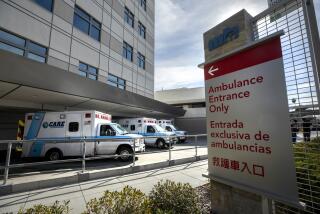Tenet Admits Price Hikes; 2 Execs Leave
- Share via
Tenet Healthcare Corp., facing a federal audit of its Medicare billings, announced a top management shake-up Thursday and acknowledged that some of its hospitals aggressively raised prices that resulted in hundreds of millions of dollars in higher Medicare reimbursements.
The Santa Barbara-based company said there was nothing illegal in sharply boosting retail hospital charges, which are used in calculating special Medicare reimbursements known as “outlier payments.” These payments are made in addition to regular Medicare reimbursements to help hospitals defray expenses for unusually costly procedures.
Under heavy pressure from investors, Tenet on Thursday disclosed that it received $763 million in outlier payments in fiscal 2002, much of it from 11 hospitals that have ramped up retail charges. Seven of those 11 hospitals are in California.
Although Tenet did not identify them, analysts believe Redding Medical Center -- which is at the center of a separate federal probe of two doctors -- is among them.
In a lengthy conference call with analysts and investors, Tenet officials did not answer a question about whether they deliberately pursued a pricing strategy so as to maximize outlier payments, which accounted for about 39% of Tenet’s earnings per share in fiscal 2002.
But Jeffrey Barbakow, Tenet’s chairman and chief executive, said it had come to his attention only recently that aggressive pricing was leading to big increases in outlier payments.
He said the aggressive hospital price hikes would now stop, suggesting that it was not good corporate policy.
“It is inconsistent with the position and posture that I want Tenet to maintain,” he said.
But many investors and analysts appeared to be shocked and disappointed by Tenet’s announcements Thursday. Tenet withdrew its long-term earnings guidance and said it would overhaul its pricing practices.
Analysts said they were troubled by the implications of a future change in pricing strategy and by Tenet’s management shake-up, which included the immediate departure of its chief financial officer, David L. Dennis, and chief operating officer, Thomas B. Mackey.
Barbakow announced the appointment of Trevor Fetter, who previously worked at Tenet, to a new position of president.
Barbakow called the resignation of Dennis and the retirement of Mackey voluntary, but analysts wondered why the two executives who probably knew the most about the hospital’s pricing strategy were now gone.
“It signals to me that the company is trying to engage in preemptive damage control,” said Sheryl Skolnick, an analyst at Fulcrum Global Partners in New York.
“They can now blame any further problems on the folks who left, who engaged in strategies that are not in keeping with the direction that Jeff would like to take the company.”
Skolnick said that she would not recommend the stock, even at its latest depressed prices.
Tenet shares were up 6% to $27.95 in regular New York Stock Exchange trading, but plunged to $19.60 in after-hours trading, during the three-hour-long conference call with investors.
Tenet’s stock has fallen from about $50 in the last two weeks, since a UBS Warburg analyst on Oct. 28 questioned Tenet’s outlier payments.
On that same day, officials at the U.S. Department of Health and Human Services notified Tenet that it would audit Tenet’s outlier payments, and the agency sent a formal letter of an audit this week.
The credibility of Tenet’s management also has been damaged by its handling of the federal raid last week at Redding, where the FBI and HHS agents seized records in an investigation focusing on whether two doctors performed hundreds of unnecessary heart procedures.
Tenet officials have said the Redding investigation and the outlier controversy are two separate issues. But they are linked in that Tenet’s Redding hospital has been getting a significant amount of outlier payments, according to analysts’ estimates.
Outlier payments are calculated by a Medicare contractor using a complicated formula on a case-by-case basis. But because gross, or retail, hospital charges help determine outlier cases, higher-than-expected increases in charges would lead to more cases qualifying for the payments.
Medicare officials say outlier payments are not supposed to exceed 5% to 6% of Medicare’s total inpatient hospital reimbursements nationwide. But Tenet’s outlier payments accounted for about 23% of its total Medicare reimbursements in the last fiscal year. Tenet’s high rate by itself does not violate Medicare rules, but it was the only major hospital company in double figures.
During the conference call, Tenet officials said that the 11 hospitals especially benefited from outlier payments, partly because of a lag in Medicare’s payment formula that allows facilities with rapid price increases to obtain huge windfalls.
“I think the basic problem lies in the outlier payments as it’s structured, and that Tenet played it to the hilt,” said Clifford Hewitt, an analyst at Legg Mason, a brokerage in Baltimore. “I don’t think it’s illegal. But it’s embarrassing. They gamed the system to an embarrassing degree and I think they realized it’s an image they can’t live with. You come across as being socially irresponsible.”
More to Read
Inside the business of entertainment
The Wide Shot brings you news, analysis and insights on everything from streaming wars to production — and what it all means for the future.
You may occasionally receive promotional content from the Los Angeles Times.











